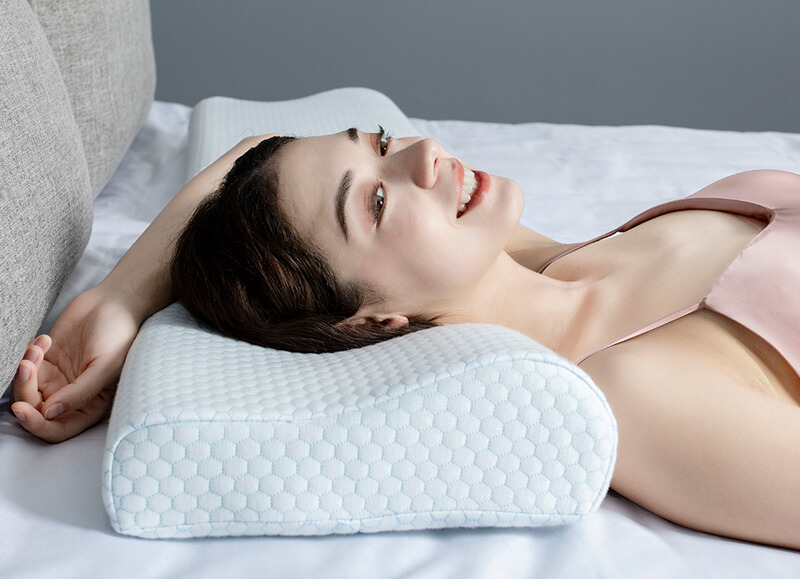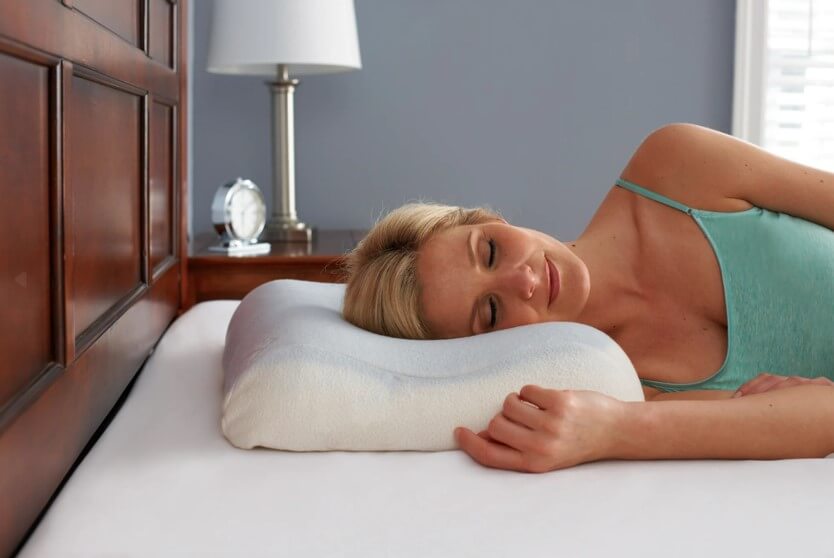7 Facts About Neck Pillow You Should Know Before Buying
In our fast-paced world, neck pain has turned into a common ailment. The hustle and bustle of life, coupled with our growing dependency on technology, have led many of us to develop poor postural habits that frequently result in discomfort. While we are quick to blame our daytime activities for this, one overlooked factor is the quality of the neck support we receive during our sleep – precisely, our pillows. Yes, your pillow, the kind you use, and how you use it, maybe the culprits behind your chronic neck pain or discomfort.
Now imagine this: you wake up with significantly reduced or entirely no neck pain simply due to choosing the right neck pillow. Sounds dreamlike? Well, it is possible with the correct understanding and selection of cushions. This blog will help you discover seven crucial facts that could potentially be your solution to a good night’s sleep, free of neck pain. With this comprehensive guide, we promise that the phrase ‘pillow talk’ will take on a whole new meaning for you!

Neck pain, often resulting from poor posture, muscle spasms, or stress, is a condition that can affect anyone bending over a desk or looking down at a device all day. However, this pain isn’t limited to our waking hours. Incorrect sleep positions and inappropriate pillows can exacerbate the discomfort. For instance, stomach sleepers often struggle with maintaining the natural alignment of the spine, leading to neck stiffness that can graduate to chronic aches.
Fact 1: Different Types of Neck Pillows
The variety in neck cushions — from standard contour pillows to specific designs like cervical and orthopedic pillows — provides a host of choices. They accommodate different sleeping positions, ensuring restful sleep and pain relief. Memory foam pillows are excellent for side sleepers and back sleepers, as they adjust to the individual’s head and neck curves. In comparison, inflatable ones, which are easy to adjust and carry, are handy for long trips.
Fact 2: Correct Alignment is Key
A night’s sleep free of pain and discomfort is the outcome of a harmonious relationship between your body and the sleeping surface. Essential to this harmony is correct alignment — specifically, the proper alignment of your neck and spine. A neck pillow is an anatomically designed structure that contours to the individual’s neck’s natural shape when lying down. The key to their effectiveness is their ability to facilitate proper alignment of the cervical spine, your head, and the rest of your body. They cradle the neck and fill in the gap between the neck and the mattress. Their strategic structuring provides comfort and simultaneously maintains this crucial alignment, resulting in sleep improvement.
However, ignoring this alignment doesn’t bode well for your body. For instance, sleeping on an excessively high or firm cushion can result in the head being situated unnaturally high, causing neck strain. Conversely, a pillow that is too soft or low does not provide ample support, resulting in a neck slouch. In either case, the neck and the spinal cord are not aligned suitably, leading to muscle tension, poor neck posture, and, potentially, interrupted sleep due to the discomfort caused by these positions. Prolonged exposure to such misalignment could result in chronic neck pain, tension headaches, and other musculoskeletal troubles.
Fact 3: The Role of Material in Comfort & Support
They are made up of a range of materials, each with a unique set of properties. Traditional fill materials such as down feathers and polyester fibers are soft and offer decent support but can lose their shapes over time and lack proper neck contouring. Buckwheat hulls are natural, adjustable, and allow air circulation for cooler sleep, but they may be too firm for some.
In recent times, memory foam has been the material of choice for many neck pillows for its unique contouring property. It adjusts to the shape and pressure of one’s head and neck, providing personalized comfort and support, ensuring that the neck is neither straining upward nor drooping downwards.
The choice of material can significantly affect comfort and support. The right material can mold to your neck’s natural curve, helping maintain the correct alignment, thereby enhancing the support. This, coupled with the material’s softness, texture, and even temperature regulation, can greatly affect your comfort level, hence the importance of considering your personal needs and preferences when selecting a material. Choose wisely, because the material matters!
Fact 4: Design Matters
The design is a major factor that influences the support it can offer to maintain the cervical spine’s natural contour. There is a myriad of designs that cater to various sleeping positions while focusing on mitigating neck pain. A prime example is the contour pillow. It has a unique design that comes with a curved design that snugly fits the space between the head and shoulders while maintaining the alignment of the spine.
For side sleepers, a neck pillow with a higher loft can help fill the gap between the shoulder and the neck, providing ample support and preventing neck strain. Conversely, back sleepers typically benefit from a cervical cushion with a specially designed depression in the middle. Remembering that design does indeed matter can be a game-changer when selecting your next pillow. It’s vital to familiarize yourself with various designs and understand what each offers. Through trial and error, find the design that suits your preferences and sleeping style.

Fact 5: The Importance of Size and Firmness
Choosing a neck pillow isn’t just about picking the fluffiest one or the one with an appealing color scheme. Size and firmness are two crucial factors that have a significant impact on support and comfort, affecting your sleep quality and possibly your neck pain. A cushion too high or too firm can cause neck strain; however, a too soft or low one might not provide sufficient support. For example, back sleepers might prefer medium firmness for natural spinal alignment, while side sleepers need a firm pillow for neck and head support between the shoulder blades.
Remember, our bodies are unique; what might work for one may not work for another. Personal comfort plays an imperative role in choosing firmness.
Fact 6: Durability and Maintenance
You should consider factors like durability and ease of maintenance in the decision process. These factors directly impact the pillow’s performance over time, affecting your sleep quality and the management of your neck pain.
A durable neck pillow means consistent support and comfort for a longer period. Factors, such as the quality of the materials used, their resilience to wear and tear, and the overall construction, contribute significantly to its longevity. For example, natural latex and high-density memory foam pillow tend to retain their shape and elasticity for a more extended period as compared to feathers or polyester fiber ones.
Alongside durability, ease of maintenance is equally important. Cushions gathering allergens and dust mites over time can lead to an uncomfortable, and possibly unhealthy, sleeping environment. As such, being able to clean your pillow conveniently becomes crucial.
There are, however, ways to upkeep your neck pillow for optimal lifespan. One method is using washable removable covers that can keep it clean and protected. Regular airing and fluffing can also help maintain the shape and firmness level. Always adhere to the care instructions provided by the manufacturer. For certain materials like feather or buckwheat hulls that require more careful cleaning, professional cleaning may be ideal.
Fact 7: Trustworthy Reviews
In a diverse market flooded with bedding options, several brands, types, and models of neck pillows, identifying the right product can be a daunting task. Real-life experiences shared through reviews or comments act as valuable guidelines, offering insight into its basic comfort, quality, and durability. They allow you to gauge aspects like actual comfort, durability, effectiveness in pain management, and even potential product issues. Also, reviews often touch upon the essential but non-technical aspects, like the smell, ease of maintenance, customer service experience, and much more, adding a comprehensive touch to your research.
Customers often share their transformative experiences. Many have reported significant relief from chronic neck pain, attributing it to the right combination of support and comfort our cushions offer. One user mentioned, “It takes a few nights to get used to, but once you do, it’s a game-changer. My neck pain has dramatically reduced”.
Understanding the seven crucial facts about neck pillows is instrumental in alleviating neck pain and ensuring sleep quality and overall health. A wise investment in the right one can pave the way for pain-free nights and productive days. Start now, make an informed choice, and sleep your way to a healthier life.
